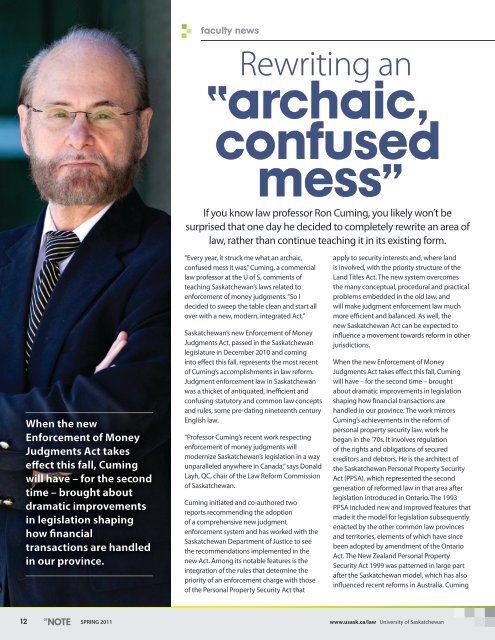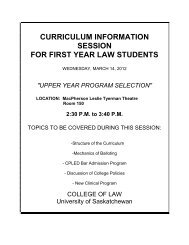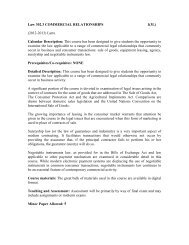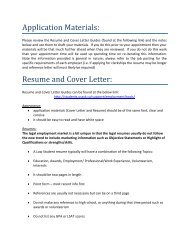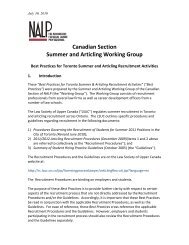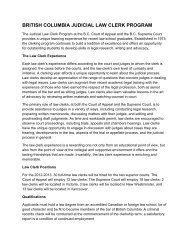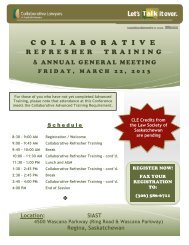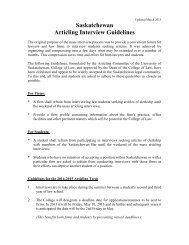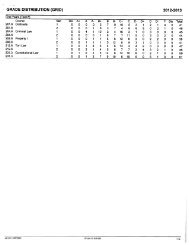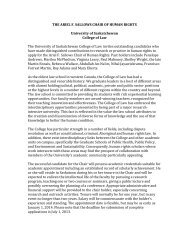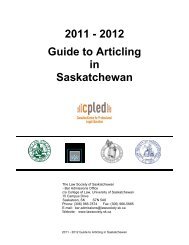Spring 2011 - College of Law - University of Saskatchewan
Spring 2011 - College of Law - University of Saskatchewan
Spring 2011 - College of Law - University of Saskatchewan
Create successful ePaper yourself
Turn your PDF publications into a flip-book with our unique Google optimized e-Paper software.
When the new<br />
Enforcement <strong>of</strong> Money<br />
judgments Act takes<br />
effect this fall, Cuming<br />
will have – for the second<br />
time – brought about<br />
dramatic improvements<br />
in legislation shaping<br />
how financial<br />
transactions are handled<br />
in our province.<br />
faculty news<br />
Rewriting an<br />
“archaic,<br />
confused<br />
mess”<br />
If you know law pr<strong>of</strong>essor Ron Cuming, you likely won’t be<br />
surprised that one day he decided to completely rewrite an area <strong>of</strong><br />
law, rather than continue teaching it in its existing form.<br />
“Every year, it struck me what an archaic,<br />
confused mess it was,” Cuming, a commercial<br />
law pr<strong>of</strong>essor at the U <strong>of</strong> S, comments <strong>of</strong><br />
teaching <strong>Saskatchewan</strong>’s laws related to<br />
enforcement <strong>of</strong> money judgments. “So I<br />
decided to sweep the table clean and start all<br />
over with a new, modern, integrated Act.”<br />
<strong>Saskatchewan</strong>’s new Enforcement <strong>of</strong> Money<br />
Judgments Act, passed in the <strong>Saskatchewan</strong><br />
legislature in December 2010 and coming<br />
into effect this fall, represents the most recent<br />
<strong>of</strong> Cuming’s accomplishments in law reform.<br />
Judgment enforcement law in <strong>Saskatchewan</strong><br />
was a thicket <strong>of</strong> antiquated, inefficient and<br />
confusing statutory and common law concepts<br />
and rules, some pre-dating nineteenth century<br />
English law.<br />
“Pr<strong>of</strong>essor Cuming’s recent work respecting<br />
enforcement <strong>of</strong> money judgments will<br />
modernize <strong>Saskatchewan</strong>’s legislation in a way<br />
unparalleled anywhere in Canada,” says Donald<br />
Layh, QC, chair <strong>of</strong> the <strong>Law</strong> Reform Commission<br />
<strong>of</strong> <strong>Saskatchewan</strong>.<br />
Cuming initiated and co-authored two<br />
reports recommending the adoption<br />
<strong>of</strong> a comprehensive new judgment<br />
enforcement system and has worked with the<br />
<strong>Saskatchewan</strong> Department <strong>of</strong> Justice to see<br />
the recommendations implemented in the<br />
new Act. Among its notable features is the<br />
integration <strong>of</strong> the rules that determine the<br />
priority <strong>of</strong> an enforcement charge with those<br />
<strong>of</strong> the Personal Property Security Act that<br />
apply to security interests and, where land<br />
is involved, with the priority structure <strong>of</strong> the<br />
Land Titles Act. The new system overcomes<br />
the many conceptual, procedural and practical<br />
problems embedded in the old law, and<br />
will make judgment enforcement law much<br />
more efficient and balanced. As well, the<br />
new <strong>Saskatchewan</strong> Act can be expected to<br />
influence a movement towards reform in other<br />
jurisdictions.<br />
When the new Enforcement <strong>of</strong> Money<br />
Judgments Act takes effect this fall, Cuming<br />
will have – for the second time – brought<br />
about dramatic improvements in legislation<br />
shaping how financial transactions are<br />
handled in our province. The work mirrors<br />
Cuming’s achievements in the reform <strong>of</strong><br />
personal property security law, work he<br />
began in the ’70s. It involves regulation<br />
<strong>of</strong> the rights and obligations <strong>of</strong> secured<br />
creditors and debtors. He is the architect <strong>of</strong><br />
the <strong>Saskatchewan</strong> Personal Property Security<br />
Act (PPSA), which represented the second<br />
generation <strong>of</strong> reformed law in that area after<br />
legislation introduced in Ontario. The 1993<br />
PPSA included new and improved features that<br />
made it the model for legislation subsequently<br />
enacted by the other common law provinces<br />
and territories, elements <strong>of</strong> which have since<br />
been adopted by amendment <strong>of</strong> the Ontario<br />
Act. The New Zealand Personal Property<br />
Security Act 1999 was patterned in large part<br />
after the <strong>Saskatchewan</strong> model, which has also<br />
influenced recent reforms in Australia. Cuming<br />
12 SPRING <strong>2011</strong> www.usask.ca/law <strong>University</strong> <strong>of</strong> <strong>Saskatchewan</strong>


